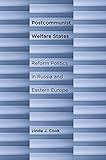Postcommunist Welfare States : Reform Politics in Russia and Eastern Europe / Linda J. Cook.
Material type: TextPublisher: Ithaca, NY : Cornell University Press, [2011]Copyright date: ©2013Description: 1 online resource (288 p.) : 37 tables, 5 charts/graphs, 3 line drawingsContent type:
TextPublisher: Ithaca, NY : Cornell University Press, [2011]Copyright date: ©2013Description: 1 online resource (288 p.) : 37 tables, 5 charts/graphs, 3 line drawingsContent type: - 9780801479007
- 9780801460098
- 361.6/50947 22
- online - DeGruyter
- Issued also in print.
| Item type | Current library | Call number | URL | Status | Notes | Barcode | |
|---|---|---|---|---|---|---|---|
 eBook
eBook
|
Biblioteca "Angelicum" Pont. Univ. S.Tommaso d'Aquino Nuvola online | online - DeGruyter (Browse shelf(Opens below)) | Online access | Not for loan (Accesso limitato) | Accesso per gli utenti autorizzati / Access for authorized users | (dgr)9780801460098 |
Frontmatter -- Contents -- List of Figures and Tables -- Acknowledgments -- Introduction: Welfare States and Postcommunist Transitions -- 1. Old Welfare State Structures and Reform Strategies -- 2. Non-negotiated Liberalization: Decentralizing Russia's Welfare State and Moving It Off-Budget -- 3. Contested Liberalization: Russia's Politics of Polarization and Informalization -- 4. Welfare Reform in Putin's Russia: Negotiating Liberalization within the Elite -- 5. Comparing Postcommunist Welfare State Politics: Poland, Hungary, Kazakhstan, and Belarus -- Conclusion: Negotiating Welfare in Democratic and Authoritarian Transitions -- Index
restricted access online access with authorization star
http://purl.org/coar/access_right/c_16ec
In the early 1990s, the countries of the former Soviet Bloc faced an urgent need to reform the systems by which they delivered broad, basic social welfare to their citizens. Inherited systems were inefficient and financially unsustainable. Linda J. Cook here explores the politics and policy of social welfare from 1990 to 2004 in the Russian Federation, Poland, Hungary, Belarus, and Kazakhstan.Most of these countries, she shows, tried to institute reforms based on a liberal paradigm of reduced entitlements and subsidies, means-testing, and privatization. But these proposals provoked opposition from pro-welfare interests, and the politics of negotiating change varied substantially from one political arena to another. In Russia, for example, liberalizing reform was blocked for a decade. Only as Vladimir Putin rose to power did the country change its inherited welfare system.Cook finds that the impact of economic pressures on welfare was strongly mediated by domestic political factors, including the level of democratization and balance of pro- and anti-reform political forces. Postcommunist welfare politics throughout Russia and Eastern Europe, she shows, are marked by the large role played by bureaucratic welfare stakeholders who were left over from the communist period and, in weak states, by the development of informal processes in social sectors.
Issued also in print.
Mode of access: Internet via World Wide Web.
In English.
Description based on online resource; title from PDF title page (publisher's Web site, viewed 02. Mrz 2022)


